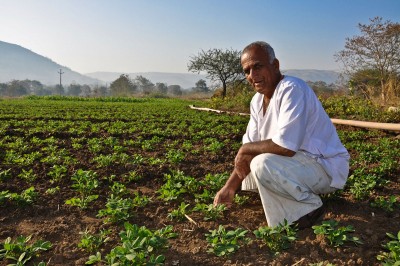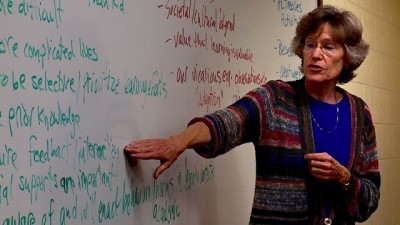
As the work of Associate Professor Sandy Bell (’94 Ph.D. in adult and vocational education) well illustrates, effective adult learning just doesn’t occur in classrooms. It occurs in barns, corn fields and even on East African groundnut farms.
The latter accomplishment— achieved by a UConn Adult Learning Program doctoral student Bell oversaw—is one of the most recent examples of how Neag School of Education faculty and students have used their expertise to make a difference not just in Connecticut and the United States, but throughout the world. It also shows how Bell is coupling her lifelong interest in farming with her expertise in adult learning to help farmers improve their practices, possibilities and profits.
Recognized as a leading expert in the field, Bell’s current work includes affiliations with agricultural extension educators and researchers at UConn, the University of New Hampshire and USDA’s Northeast Sustainable Agriculture Research and Education program. She’s also one of 11 educators and researchers, from six New England states, collaborating to earn a federal grant that will support developing effective ways to teach local farmers how to adopt food safety practices that will allow them to expand their market to schools, hospitals and other sites that require vendors to meet certain USDA certification requirements.
“Some small-scale and organic farmers feel that certification requirements place an undue burden on them, particularly in terms of record keeping and employee training. Some may even feel that their practices and their produce are already as safe as possible,” Bell said. “Our group wants to better understand how attitudes like these may get in the way of learning and find ways to show hardworking farmers how they can conveniently incorporate USDA requirements into their practices, so it becomes a win-win for everyone.”
Her role in a research study designed to help agricultural extension providers better meet the needs of East African groundnut farmers was part of a recently published article. The piece in the Journal of Agricultural Education and Extension outlines the efforts she, doctoral student Mary Thuo, Agricultural and Resource Economics Professor Boris Bravo-Ureta, PhD, and others undertook to identify how the groundnut farmers learned about new seed varieties and design educational processes to help farmers increase productivity.
For a country like Uganda, where the majority of people depend on farming for both cash and food, learning new best practices can lead to much more than higher profits. It can lead to a significantly improved quality of life.
“We’ve had several agricultural extension professionals from Africa come to UConn to earn graduate degrees and gain the knowledge needed to go back and help farmers learn new approaches. Maybe even more importantly,” said Bell, “these students gain research and leadership skills to develop training programs for other extension educators so that they can look at the specific challenges farmers face, and then create the most effective learning processes to help them meet those challenges.”
“People generally don’t realize just how far-reaching our adult learning program can be,” continued Bell, who several years ago recognized that for growing concepts like conservation and sustainability to be put into practice, those championing the causes would need to know how to best communicate with, and teach, other adults.

As program coordinator of the Neag School’s Adult Learning Program (part of the Department of Educational Leadership), it’s Bell job to keep track of the roughly 30 students who, at any one time, are working toward a graduate certificate or degree. Students come from a variety of disciplines, including human resources, health care and technology.
Like Thuo, who worked in agricultural extension in her home land of Kenya before coming to UConn, some have agriculture service backgrounds and are eager to take advantage of Bell’s experience and the wide variety of research and outreach education opportunities offered through UConn’s College of Agriculture and Natural Resources, Storrs Agricultural Experiment Station and Cooperative Extension System.
“At one time, there was a huge void in agricultural education in terms of adult learning,” Bell explained. “It’s still not completely filled, but there’s now a small, solid core of us working to help agricultural and environmental experts effectively share information and support people in changing their behaviors in ways that enhance profits but also protect the environment. What’s unique about adult learning is that the general principles don’t change across disciplines—just the examples you choose to make the learning meaningful. It’s exciting to make a difference—especially in agriculture, where I have so much respect for farmers and the dedication of farmer educators.”
 Facebook
Facebook
 Twitter
Twitter
 LinkedIn
LinkedIn
